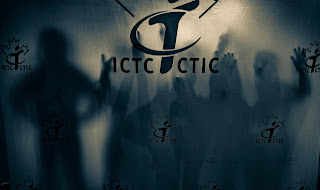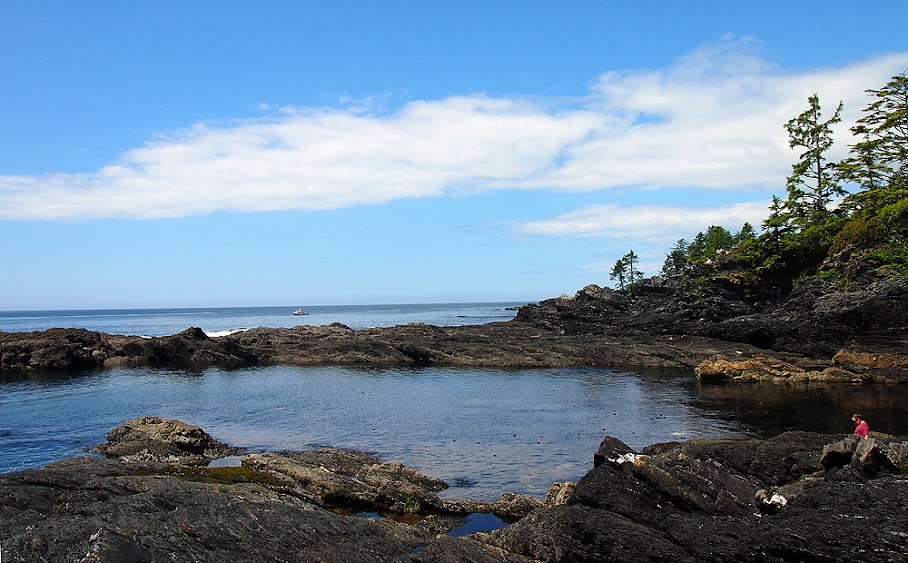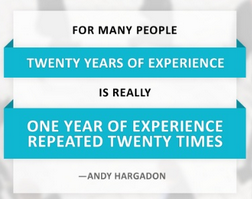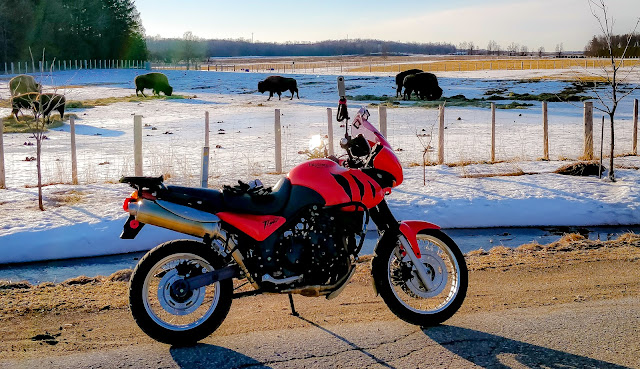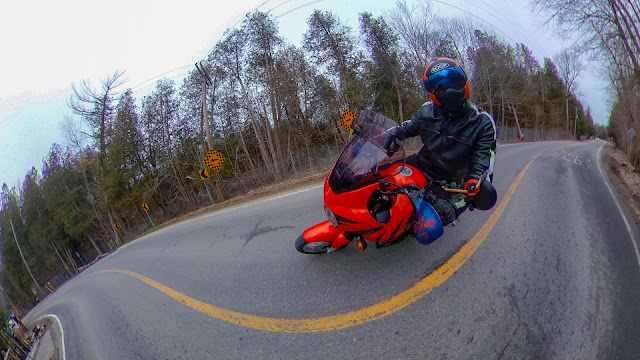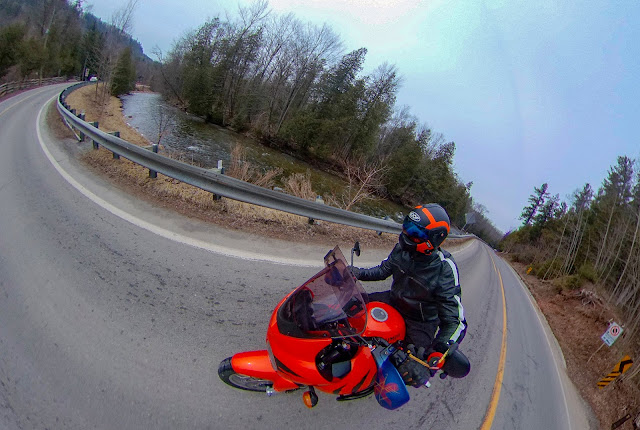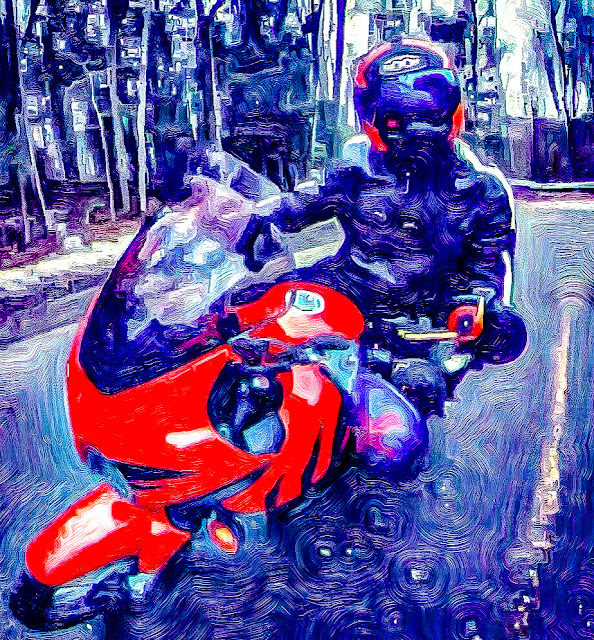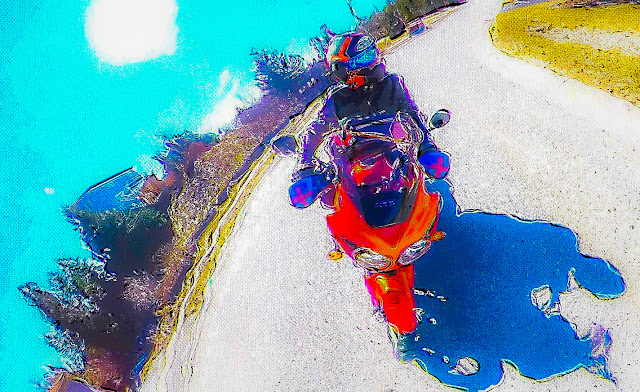I somehow managed to fanangle my way into an Edtech symposium this week on the sustainable development of digital technology in education. Amidst former deputy ministers of education, board CIOs and other provincial education types I got to see the other side of the equation.
Privilege Masquerading as Superiority
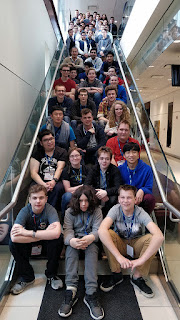 Last year while at the CyberTitan National Finals in Fredericton I happened to be standing by Sandra Saric, ICTC’s VP of talent innovation, during a photo opportunity where the fifty or so student competitors were all together on a long stairway. Under her breath she wondered, “where are all the girls?” There were maybe three or four female contestants. Sandra’s comment resonated with me and I became determined to put together a female team that would get their own points and where no one is ‘just a sub’.
Last year while at the CyberTitan National Finals in Fredericton I happened to be standing by Sandra Saric, ICTC’s VP of talent innovation, during a photo opportunity where the fifty or so student competitors were all together on a long stairway. Under her breath she wondered, “where are all the girls?” There were maybe three or four female contestants. Sandra’s comment resonated with me and I became determined to put together a female team that would get their own points and where no one is ‘just a sub’.
CyberTitan and Cyberpatriot have doubled down on this focus on bringing women into a cybersecurity industry that has only moved from 11% to 20% female participation in the past five years. For the 2018-19 season any all-female teams had their costs waived. For a program that isn’t rolling in support, that made a big difference and enabled me to pursue this inequity.
Graduating girls into non-traditional careers is an ongoing challenge in education. Pushing against social norms is never easy, particularly so in our conservative, rural school where gender expectations tend to be even more binary and specialized program support significantly lower than in urban environments. I’ve managed to have one or two graduating female computer technology focused students each year, but even that small step has only come after massive effort, and it’s not nearly enough. Even with all that stacked against us, we still managed a 33% female participation rate in CyberTitan this year, and of our six Skills Ontario competitors, two were female. We’re aiming to raise that even higher next year.
This year CyberTitan made a point of trying to address the very one sided gender participation in the cybersecurity industry by making the national wildcard position open to all-female teams. There were only 15 out of 190+ teams in the competition, and our Terabytches finished in top spot. We were delighted to discover that one of our boy’s teams actually finished one place out of the top four eastern teams. A number of people (oddly all male) grumbled about the all-female wildcard spot, but the irony is that we knocked ourselves out of the finals.
Taking an all-female team meant that I needed a female chaperone with us. Fortunately, our board’s head of dual credit programming is a triple threat. Not only is she very tech focused (her student just won top secondary brick layer in Ontario!), but she’s also computer science qualified and an absolute joy to travel with (I went to Skills Canada Nationals in Edmonton with her last year), so I quickly asked her to join us when the call came through to bring our girls to nationals. Not only did she not need coverage herself, but she kindly covered mine so my school literally paid nothing for this trip.
I like to think I’m pretty sensitive to gender roles in the first place, but taking an all-female crew to this event had me constantly seeing micro-aggressions I might have otherwise missed. Within five minutes of picking up the Toronto (all-male) teams on the bus ride to Ottawa, one of them had intimated that we were only there because we’re a girl’s team. Another later said that it’s not fair that girls are getting special attention. It must be tough when everything isn’t about you all the time. These comments were a daily occurrence from all the other teams, even the two co-ed ones, one of the girls of which said that she was just the sub.
That same Toronto team was able to attentively listen to a male speaker during the visits to cybersecurity companies in the Ottawa area after the competition, but the moment a woman stepped up to speak they began a loud and rude conversation among themselves. I wonder how often these little princes (who did ever so well in the competition) have had their gender superiority enforced to develop such outstanding habits.
Walking in to the competition, our team had all signed in but one and as she reached for the pen a boy from another team stepped in front of her like she wasn’t there. Talking to Joanne and the team about it after, they shrugged and said, “you get used to it.” By that point I’d been triggered by this so much that my already light grip on my aspie-ness was slipping and I was starting to get right angry, but even that anger response is couched in a male sense of privilege. When a man gets angry it’s seen as assertiveness, when a woman gets angry she’s a bitch, which brings up yet another point.
 After fighting to get a team together against overwhelmingly genderized expectations in our community, and encouraging that team to develop a representative sense of identity in an overwhelmingly male contest, and then having to push back when the powers that be didn’t like the name, you’d think this was all starting to get too heavy, but it has only clarified my sense of purpose.
After fighting to get a team together against overwhelmingly genderized expectations in our community, and encouraging that team to develop a representative sense of identity in an overwhelmingly male contest, and then having to push back when the powers that be didn’t like the name, you’d think this was all starting to get too heavy, but it has only clarified my sense of purpose.
Wouldn’t it be wonderful if girls didn’t have to get used to being invisible and could self-identify without being told what they can and cannot be called? Wouldn’t it be wonderful if everyone could be what they are and explore what they could be without some small minded traditionalist trying to put them in a superficial box? When you push back against that social apathy you get a surprising amount of kickback from the people it benefits. Ontario’s current political mess is entirely a result of that conservative push back.
You even get kick back from the people it subjugates. At an ICT teacher’s meeting earlier in the year, a teacher from an Ottawa school said she would never run an all female team because it isn’t fair to her boys. Were everything else level, I’d agree with her sentiment, but in the landslide of unfairness around us, you’d have to be wilfully blind to ignore historically integrated misogyny in order to be ‘fair to your boys’. This teacher taught at the local International Baccalaureate school, which brings up yet another side of competition and privilege.
| Toronto, Winnipeg, Edmonton, Vancouver… Fergus. Your usual expected centres of digital excellence. |
We’re a rural composite school that spreads itself thin catering to our entire community. The major industry in our region is farming, we recently had our annual Tractor Day. Our school contains programs for developmentally delayed students and has a sizable special needs student population. We also manage to run a number of successful academic programs, but these are by no means our sole purpose. Tech exists in there somewhere.
As far as computer technology goes, our lab is a room full of ewaste we’ve re-purposed to teach ourselves technology. Thanks to some board SHSM funding and an industry donation from AMD we got the cheapest CPUs and motherboards we could find and put them in ten year old ewasted board PC cases running on ancient hard drives and power supplies. My students have never touched a new keyboard or mouse in our lab. We have to clear away our practice networks built of garbage because we have the largest tech classes in our board and province and we have no room in the lab to leave those networks set up with classes of 31 coming in next period. I don’t imagine any of the other schools operate in a similar environment.
We returned the board desktops in our room to the school who redistributed that money into other departments because you can’t teach digital skills on a locked down machine. We’ve received no school funding for the current lab. Looking into the backgrounds of who we were up against in this competition, every other school is a specialist school from an urban centre. In many cases they only teach top academic stream students pulled from other schools, and yet they can’t put together an all-female team for this competition? One wonders if those competition focused, talent skimming schools inherently encourage gender imbalanced technology with their incessant focus on winning.
 |
| We’re built on sweat and tears. Our disadvantage is also our strength, but when it comes to competition it gets frustrating not getting to run the same race as everyone else. |
The socio-economic side of privilege is every bit as battering as the sexism. One of the little princes from Toronto was telling a Terabytche about his parent free March Break touring Europe with his friends. She replied, “Hmm, I spent the week playing video games in Fergus…” Last year half of our CyberTitan team had never left Ontario before, let alone had a week in Europe with their buddies. The students who attend these specialized schools tend to come from economically enabled backgrounds and have parents looking to leverage that advantage. The amount of support those wealthy families rain down on these specialty programs is yet another advantage we can only dream of.
Think the privilege ends there? Because we cater to the full spectrum of students in our community, my classes are huge in order to reserve smaller sections for high-needs students (even though many of them also take my courses). In talking to other coaches, my class sizes were the largest by a range of 20% to a staggering 50%, and their operational budgets ranged from five to twenty times what mine are; I teach up to a third more students with a fraction of the budget in a lab made out of garbage.
We were surprised to learn that we would be beginning the competition short-handed because one of the IB schools had exams some of their competitors had to write, so to keep it fair we’d all start short handed. Right. Gotta keep it fair.
That these urban, wealthy, gender empowered, privileged kids are flexing that privilege doesn’t surprise me. That they continually complained about special treatment for a group of underfunded, rural, girls busting through gender expectations in technology, and who fought their way to these nationals literally using ewaste, only underlines the expectation that comes with their privilege; the expectation of winning.
In spite of these society-deep gender inequities and our specific socio-economic circumstances, the quality of my students continues to shine through. Finishing fifth last year with only four team members and two broken competition laptops was just the kind of awesomeness I’ve come to expect from our kids. It didn’t occur to me to have the whole competition changed to make it fair for them.
This year we managed a ninth place finish out of ten teams, only beating the intermediate team who can’t really compete with older more experienced teams anyway. That earned another round of, ‘you’re only here because you’re girls’ from other teams. After careful consideration I think my response is: if you came from where we came from, I wonder where you would have finished.
Is winning more about how you perform, or how you are economically and socially engineered to succeed? I’d love to give gender and social equity to those complaining about our presence. Having those boys experience people talking over them and stepping in front of them like they aren’t there would be good for them. Facing down gender based prejudice in an industry where women are a small minority is an act of bravery, not special treatment. Wouldn’t it be nice to bring everyone up instead of holding people down? To do that we need to recognize what winning is and how privilege enables it.
Next year we have returning students for the first time in this competition. I’m aiming to put a co-ed team of our fiercest veteran cyber-ninjas together, build tech out of garbage and then win anyway. Nothing gets me going more than an underdog fight against privilege, especially when those with that privilege like to selectively ignore it.
I hope we’ll be back with another all-female team too. Many of the Terabytches are interested in returning, but I can understand their hesitancy. Working through this competition has challenged many of them in ways that were unintended. If it was just about technical skill, then we’d have been much further down the track, but when you have to fight to be noticed and are constantly talked down to, it’s exhausting. I get why they might think twice about going through the never-ending online and face to face sexism all over again. It’d be nice if other schools would pick this up and run with it instead of rolling their eyes at it.
Last year was all about giving the haves a black eye, and it thrilled me. We didn’t return home with a trophy or a banner, but we were running a different race. I’m not even sure how anyone could make this an even race. Teaching technology is dependent upon access to it, and the digital divide is deep and wide. This year it was about something even bigger. Yet again we came home empty handed, but I think what we won was worth more than any of the prizes. I hope the girls see that and come back to defend their title.
 |
| An amazing opportunity and a chance to begin to create balance in an industry that lacks it. Great work ICTC! |
from Blogger http://bit.ly/2Qf7aA5
via IFTTT
April Fools Forks Of The Credit
 It crawled up to near double digits on Saturday, April 1, so Max and I took the Tiger by the tail and went for our first ride over to The Forks of the Credit.
It crawled up to near double digits on Saturday, April 1, so Max and I took the Tiger by the tail and went for our first ride over to The Forks of the Credit.On our way over to Erin we were stopped at a light when a truck passed us carrying an spanking new Africa Twin – very nice. The truck driver was giving us thumbs up and we gave ’em right back.
We stopped at the Busholme in Erin for a warming lunch; 8°C on a motorbike will cool you off quickly. It’s now on Max’s places to eat memory map. After a quick stop at Holtom’s Bakery we headed over to the Forks and did a lap…
The ride from Belfountain out to Highway 10 was lovely – clear of speedbumps (both on the road and the four wheeled kind). It was cold and there was still a lot of snow runnoff crossing the road, but I could let the bike go as fast as it felt comfortable without having to worry about some Ontario numpty in a box in front panicking that the road actually has curves on it.
On the ride back to Belfountain for my first coffee of the year at Higher Ground, we quickly caught up with just such a numpty driving a Subaru WRX… and he was driving it like he stole it his grandmother. Baffled by every bend in the road, this toolasaurus in his rally car practically stopped every time the road got interesting. Max and I, two up on our fourteen year old adventure bike almost pulled off to let this guy have his moment of sheer driving brilliance. I guess that’s why you buy a forty thousand dollar rally car knock off and then drive it out to one of the few twisty roads in the area.
Soon enough we got to Higher Ground where only the very serious people were out. The parking lot was littered with half a dozen BMW adventure bikes, a Ducati Multistrada and two Triumph Tigers once we got there. Ours was the oldest bike by ten years. There were a lot of peaked adventury helmets and Klim clothing. Everyone felt very robust and adventurous.
Off the bike it was twelve degrees and sunny, so looking at all the bikes and chatting with the other riders was a nice break from the frost bite at speed.
We wrapped up our coffee break and took Mississauga Road north past the ski hill still thick with snow before heading back home a bit wind burned and out of practice saddle sore, but happy to have gotten the first two up ride of the year in.
| Loading up at High Ground for the Ride home. |
| Mississauga Road north behind another four wheeled speed bump |
| A veil of beautifully scalloped clouds followed us all the way home. |
| All taken from the 360Fly4k suction cupped to the wing mirror and edited in-camera. |
from Blogger http://ift.tt/2oxaUSz
via IFTTT
Sea to Sky and Back Again
My son and I are two up on a BMW F800ST on our way out of Sooke on Vancouver Island’s south coast. It’s the last big stop before heading into the wild, and it’s not that big a stop. The road has met up with the rocky shoreline and I’m bending the bike left and right around constant corners, I’m seldom able to see more than a couple of hundred feet down the road. From the steep hillside down to the Pacific Ocean a deer pops over the barrier onto the road right in front of us. The BMW seamlessly comes to a stop five feet in front of the startled deer that tears off into the forest. I wait for the inevitable follow up deer and see it next to the barrier watching us. We pull away slowly and elect to ease off a bit and keep it under 80 kilometres per hour. Even at speed limit speeds this road is something special.
I’m supposed to be in class, at work, instead I find myself over four thousand kilometres away from home on a cool and sunny Friday morning at the end of May with a rented motorcycle, beautiful weather and three hundred kilometres of astonishing roads in front of me, sometimes life offers up nice surprises.
I’ve only been riding on the road for just over a year. I have my M2 license and I left an ‘07 Kawasaki Ninja 650R at home. The BMW is only the second road bike I’ve ever ridden. It’s amazing how different two machines that do the same job can be. The BMW is a bigger bike, with larger seats, it’s much more comfortable according to my pillion. The suspension is soft and supple compared to my Kawi, and the controls feel lighter. The clutch take up is smooth and the brakes make me think I need to do the front pads and bleed my Ninja when I get home. The BMW is a more mature bike in every sense. The redline is a sane 8000 rpm, and with the soft suspension and big seat it’s easy to ride for a long time. Other than the weird left hand/right hand indicators it’s an easy transition from the Ninja (one of the reasons I chose it).
 |
| The rider of this fine machine, in his beaten up, old BMW leathers was in his seventies! |
We work our way down this increasingly empty coastal road until we stumble across the small town of Shirley and Shirley Delicious. We’d been told by the technician at Cycle BC where we’d picked up the bike that the temperature can drop ten degrees on the coast, and he wasn’t wrong. After a hot coffee warm up and the best sausage roll I’ve ever had, we bump into another BMW rider who is in his seventies. After some affable, Teutonic chat we are back on the long and winding road.
| From Sooke to Port Renfrew, endlessly entertaining |
From Shirley we wind our way north west up the quiet coast of Vancouver Island. The east coast faces Vancouver and is as busy as anywhere in Canada, but the west coast faces the endless Pacific and remains largely unpopulated. From Shirley we saw only a couple of other vehicles as we chased the tail of this amazing road that clings to the side of mountains edged by ocean. The switchbacks that lead down to single lane bridges over mountain rivers look more like Scandinavian fjords than Canadian back roads.
We stop and stretch about forty minutes into the ride at a scenic lookout, which along with many provincial parks, dot the route. As we clear the straits between Vancouver Island and the mainland and begin to face the Pacific, tsunami warning signs and escape routes begin to appear. You really get a sense of being on the edge of the world here. The edge of North America, the edge of the former British Empire, facing half a world of ocean.
Port Renfrew is more an idea than an actual place; a few buildings scattered among the trees. We pass through it in moments and find ourselves on a rough paved road into Juan de Fuca Provincial Park where we hope to find Botanical Beach. We strip off the bike gear and stow it in the big Givi box on the back and head down the trail. The tide is out and an amazing beach full of tidal pools awaits.
We warm up on the long walk down and soon find ourselves clambering over black stone jutting into the ocean. The sea life is prodigious, with massive strings of clams, crabs and a million other things crawling on the rocks. The smell of salt and sharp, clean air is magical. We’re the only people we can see.
| Jurassic Park has nothing on Juan de Fuca! |
We spend two hours wandering around the rocks, but I’ve only got the bike for the day and the sun is way past noon. A quick uphill hike back to the bike has us both sweating. I figure we should eat and the Coastal Kitchen on the way in looked like a good choice, but my son has a thing for chain restaurants and says he isn’t hungry (though he was). I don’t get to the Coastal Kitchen, one of my few regrets on this trip.
I’m looking at my watch and wondering how I can possibly get back to Victoria since it’s getting on for 2pm and we’re not even halfway around our loop yet. Lake Cowichan is halfway across the island. It’s only 63 kilometres away but this road is something else, you don’t make time on it. Around every corner (and there is always a corner) you find idyllic waterfalls, tumbling mountain rivers and absurdly beautiful alpine vistas.
| Almost two thousand metres in elevation changes, it’s as uppy-downy as it’s lefty-righty |
The BMW is bending left and right over the patchwork surface of the road, the soft suspension soaking up the bumps. I get into a rhythm and lose myself for a while chasing this road.
Unlike the Ninja, I can barely feel Max back there until he uncharacteristically thumps into me as a I brake for a switchback. He mumbles that he’s ok, but we’ve been on the road since 9am, he’s had no lunch and he’s dopey, not a good combination. I push on to Lake Cowichan, now more worried about him than enjoying the ride. I really wish we’d eaten at the Coastal Kitchen before leaving Port Renfrew, we’re not putting that to a vote next time.
We stop in Cowichan and eat lousy fast food at an A&W. He perks right back up and we get back on the road quickly because it’s getting on to 4pm and I’ve got less than two hours to return the F800. But Cowichan marks the return to the populated side of the island and the highway out of it is the first 100 km/hr zone we’ve seen since leaving Victoria. In a flash we’re back to the Trans Canada in Duncan and, after a day spent virtually alone on twisting roads, we find ourselves in a traffic jam surrounded by box stores. We wait our way through the worst timed traffic lights ever in Duncan and finally get moving south towards Victoria.
Even a commuter road like this makes most roads in Ontario look sad. It’s smooth (it barely snows here and frost heaves are all but nonexistent), and the asphalt constantly snakes over and around mountains. Though very different from the west side wilderness, the highway ride back to Victoria was nice too.
At speed the BMW is surprisingly comfortable. The tiny screen on the front had me doubting its high speed comfort, but now I understand how wind to the chest can keep your weight off your wrists. At highway speeds you seem to lay on the wind, it’s remarkably comfortable. The minimalist aerodynamics on the F800ST do a surprisingly good job.
Once clear of Duncan we don’t see another slowdown until entering Victoria, and it isn’t a big slowdown. By five o’clock we’re pulling back into CycleBC’s downtown shop, tired but elated. The bike did the whole trip, over three hundred kilometres all told, on a single tank. It also cast some perspective on my Ninja.
The BMW’s suspension makes me want to look into the Kawi’s, but a 650R is a very different kind of bike than an F800. Given a choice though I’d take the BMW’s buttery, compliant suspension over the teeth rattling shocks on my Kawi. I thought the lack of a windshield would hurt the BMW but it was surprisingly good, and makes me question the turbulence I get off the aftermarket windshield on the Ninja. The weird switch gear on the BMW wasn’t convenient, but all of the controls were light and responsive, making the bike a joy to take down twisty roads. It all sounds like a slam dunk for the BMW, but there is one place where the my older Kawasaki leaves the BMW behind.
 |
| It’s pretty and capable, but it has the heart of a tractor |
After lugging that BMW engine around for a day I was happy to put it down. At best it chugged down the road, but most of the time it sounded agricultural. One of the reasons I fell for the Ninja was the sound of its engine, I’ve seldom heard anything happier. Whereas the BMW goes about its business with conservative, grim faced determination, the Kawasaki is an eager accomplice, with a soprano’s voice. While the BMW is grumbling to its redline something magical is happening in the Kawasaki. Happy up to 8000rpm, it dives to the 11,000 rpm redline with a euphoric banshee wail; the last half of the Ninja’s rev range is something wonderful. That it also manages to feel stronger than the BMW even though it’s a much smaller lump is also telling.
I enjoyed riding the BMW, but it didn’t move me. The good news is I now have much higher standards for control feel, brakes and suspension, but without that all-singing engine I’m just not smitten.
As for the trip, it was unforgettable. From sea to sky and back again, it was challenging, exhausting and completely worth it. Were I to do it again, I think I’d get the bike for 24 hours instead of 8 and stay over in Cowichan before coming back the other way down the empty coast. That road deserves two way attention, and I’d happily avoid the traffic in Duncan and the stress of trying to rush the bike back at the end of the day. It also eat lunch at the Coastal Kitchen, damn it. The days are long on Vancouver Island in the summer. If you left at noon on one day, you could meander up to Cowichan enjoy a 10pm sunset and be on the road well after sunrise at 6am the next day looking forward to retracing those mad roads back to Victoria – you’d also miss rush hour on both sides.
CycleBC is located in downtown Victoria right under the conference centre attached to the Empress Hotel. The staff are quick to get you on the road, know the area inside and out and offer up some great insider tips (why we ended up making a point of seeing Botanical Beach). They offer a wide range of bikes from the F800ST I was on to a BMW GS, Suzuki Vstrom, Kawaski KLR, Triumph Bonneville and various cruiser options. Everything looked to be in top form (they have an onsite technician), and the F800 was flawless for us.
If you get a chance to ride southern Vancouver Island, you won’t be disappointed. Next time I’m out there, I’m looking at a longer ride around more of the island.
Perfect Moments on 2 Wheels
Lexus has this ad about being in the perfect moment:
The real question is: what is it about riding a motorcycle that causes this kind of continuous immersion in the perfect moment? (redundant perhaps, every moment is perfect isn’t it?)
When I ride well I find myself immersed in what I’m doing I lose myself in it. It’s only when conscious thought arises that my corners aren’t carved perfectly and my gears are wrong. Some of this has to do with the fact that I’m still relatively new to motorbiking and very conscious of improving my process, but the majority has to do with the immersive nature of riding a motorcycle.
| I even look happy parking the bike at work! |
Being in the wind means you are enveloped by the world you’re passing through. Your senses are alive to sounds, smells and the panorama around you. You aren’t seeing the world through a letterbox wind shield and smelling recirculated A/C. The sensual nature of riding, the wind tugging at your clothes, the sun on your back, goes a long way to making you the ride rather than you doing a ride.
If the sensual side of it isn’t enough (and it’s often overwhelming, ask any biker who has felt the temperature drop and smelt the ozone as they’ve ridden into a thunderstorm), there is always the mechanical intimacy of riding a motorcycle to make you forget concious thought and become one with the moment.
Unlike the hand on the wheel, one foot on the gas approach to driving, the motorcyclist is changing gears with their left toe, rear braking with their right, operating the clutch and indicators (and sometimes horn, lights and choke) with their left hand and twisting the throttle and applying the front brakes with the right. On top of that they are using both arms to counter-steer into corners and their whole bodies to manage those turns. Motorcycling is a viable and complex form of exercise for both the mind and body.
So what we have here is a mode of transport that is physically taxing, mentally demanding and sensual. On top of all that, if you do it badly it can very quickly become fatal. You very quickly want to be able to fall into the zone when riding. Peak performance and awareness it fosters isn’t nice to have but a necessity when operating a motorbike. Fortunately, getting to that state is fantastically rewarding. There are a lot of ways to get there but seat time seems to be the magic ingredient.
In a cruel twist, this morning I got the bike out for the short commute to work. The rain had stopped and the smell of water soaked plants filled the humid air, but my up-until-now bullet proof old Concours wouldn’t start, it had a dead battery! Maybe I left the ignition on? Maybe some water got into things? Maybe something broke? Suddenly that string of contented moments I was looking forward to became a morose push back into the garage after changing out of my gear. My commute turned from fifteen minutes of bliss to the tedium of driving. The bike is a wonderful form of therapy, except for when it doesn’t work.
In The Crowds: Scripted Experiences
I’m just back from my first trip to California. Having visited it so many times virtually, I was surprised at how different the place is from how it frames itself. Like a movie set, Southern California has a face that looks good while hiding a lot of things that don’t work.
My favourite parts of California were the real bits: the coast, Joshua Tree Park, Mount Palomar. It got dodgy for me the minute we wandered into the invented places, strangely also the most crowded places.
We’re all victims of our own childhood. My parents spent ours taking us camping. When we went to The States we visited family and hung out on the beach. In Florida we went to the Kennedy Space Centre, but never Disneyworld. This might have had as much to do with how much disposable income we had as it did with our interests.
Going to California for the first time, my wife, who has fond memories of attending Disneyworld as a kid, wanted to show me Disneyland. I’ve had a long personal history with Disney. It was what we watched as a family on Sunday nights on TV growing up. The first film I ever saw was Jungle Book. Being an animator at Disney was a long time dream. I’m anything but a Disney hater, but I’ve never had an interest in going to their theme parks.
Going on Christmas Day with thousands of giddy people in mouse ears felt like attending some kind of cult meeting. I don’t do well in crowds and this particularly day is one of the busiest the park has. I enjoyed various aspects of the park, but at the end of a hot, sweaty, crowded day, what it did most was clarify for me the difference between a shallow, scripted experience and a genuine one that offers depth of narrative.
I used to enjoy amusement park rides, but nowadays if I want a thrill I’ll scare myself for real on a motorcycle rather than sitting like a lab mouse in a centrifuge. I prefer a situation where my own skill dictates the quality of the physical experience. This also ensures that the experience will be mine instead of what is spoon fed to me. Two people on a rollercoaster walk away with the same cookie cutter experience. Two people riding motorbikes on a mountain road do not.
My son isn’t a fan of rides either, so we tended toward shows and entertainment rather than lining up to strap into spinning things. The Star Wars tour, Pirates of the Caribbean and various stage shows all offered a focus on entertainment rather than vacuous adrenaline. Disneyland tends to focus on immersion in the Disney ethos, so you can easily go to the park and not once get on a spinny ride. Having said that, we didn’t go on ‘It’s a Small World‘ because it would have taken two hours of lining up to see just how small the world is.
Strangely, I’m more than happy to shift into a more passive mode and follow a narrative on the screen. Experiences that use digital technology to create interactive, sensory experiences are quite interesting to me. In our time in California we also went to Universal and did the Minion Mayhem ride, which is a great example of advanced digital media being used to create an experience, it feels like a roller coaster with a plot. Pirates of The Caribbean also was remarkably immersive with complex robotic tableaus that told a story. Star Tours was a nice mix of both, with a smartly done interactive line up that leads to a digitally immersive ride; I can get lost in narratives like those.
Now that I’m back in school I can’t help but consider these ‘amusement park’ experiences in terms of learning. There is such a strong emphasis on engagement at all cost that many classrooms have taken on the giddy quality of the spiny ride, complete with lineups to get on the digital tools needed. Any experience that comes out of it tends to be scrambled if retained at all, and the idea of patiently building deeper understanding doesn’t have a chance. The hook becomes the reason for the lesson rather than anything you can immerse yourself in and take away afterwards.
I’ve heard students talk about how they ‘did’ a rollercoaster – as though their interaction with it somehow affected the outcome. The rollercoaster did them, they didn’t do the rollercoaster. When students talk about video games designed to deliver you to a conclusion I feel the same way – the game played you, you didn’t play the game. When failure is never an option, you never get to succeed at anything. It’s the difference between real and not real experience. I’m willing to bet that, if surveyed, the majority of students would feel that their education was something that was done to them rather than anything they had a say in the outcome of.
When I think of those millions who press their way through Disney to see concrete starfish plastered on walls when real ones are only a few miles away at the beach, I wonder what it is we’re aiming at in terms of engagement. Giving people what they want is often pointless when what they want is empty.
A State of Constant Surprise
On the bike I tend to pay very close attention to people piloting the boxes around me, mainly because they can quite easily hurt me. That close attention has shown me that a surprising number of drivers (anecdotally more than half) are in a constant state of surprise. They jump when they notice someone walking down the sidewalk, they start when a light changes in front of them; they are permanently startled by everything around them.
These jumpy people must be exhausted when they get out of the car. I wonder if they are equally surprised by everything when they go for a walk. Perhaps their subconscious is just continually reminding them that this driving thing is a bit more than they can manage. Next time you’re riding or driving try to consciously register how often you’re surprised by events around you. It’ll say something about how well you’re doing it.
When I started driving I found that my mind wandered and I wasn’t always paying attention to what I was doing. After an accident (not entirely my fault, but I could have avoided it had I been paying better attention) I made a promise to myself to make driving the priority in my mind when I’m at the wheel. I developed a relaxed, alert driving style that allowed me to take in what was around me while also being able to respond to it quickly and smoothly. When I did something wrong or found myself in a bad situation, I’d consciously review it and ask myself how it got like that and try think of alternatives for the next time. It took me a long time, some advanced driving courses and some track time to get me where I wanted to be in terms of driving, but I don’t look surprised or start at everything I see like a rabbit in a field. I suspect most people are lost in thought when driving matters interrupt them, and if something bad happens embarrassment forces them to ignore it rather than critically review it.
 |
| Most drivers behind the wheel. Being freaked out is not the same thing as being alert or responsive. |
If you don’t make a conscious effort to develop a skill it atrophies. Practice by itself isn’t improvement. In many cases it’s just reinforcing bad habits, which is what I see every day when I’m closely watching the habitual people around me with years behind the wheel driving in a constant state of shock and awe.
When you consider that the last time most drivers made an effort to learn how to drive was when they needed to get a license, many of them are not only trapped in bad habits but have also forgotten what little they did pick up years ago. Bafflingly, insurance companies award these ‘expert’ drivers with lower rates. There is nothing expert about them.
People often say that riding a motorcycle on the street is a dangerous business and they aren’t wrong. Getting hit by a startled rabbit in a three ton metal box is gonna hurt no matter how startled they are. The trick is to see the rabbits and give them enough space to drive badly, it’s all they know how to do.
Spring has Sprung (kind of): the first 2019 Motorcycle Photography
With winter reluctantly letting go of our necks, I’ve been able to sneak the odd ride in amidst the ongoing ice rain and snow. I recently got a Ricoh Theta V. This has the same camera and resolution as the previous (and much cheaper) Theta S, but has much better in camera processing that allows it to take 4k video and make photos without as much lag. What that means for the ongoing on-bike photography experiment is that I’m able to capture photos faster and catch moments that might have been missed before. I mainly focus on still photos doing this, but I’ll eventually get around to taking some 4k video as well.
For the past month or so I’ve been able to sneak out between wintery blasts and catch some early on-bike shots using the mounting rig I built last year (a flexible octopus gripping tripod and an extended threaded rod that allows me to place the camera further away from the bike). Here are some shots from the ThetaV:
Photos in this set run from March 24th to April 13th. Even last weekend I was still seeing patches of snow in ditches, though last Saturday was the first time I got back from a ride and didn’t have to wash all the salt and crud off the bike before putting it away. It’s still fleece and leathers season if you’re riding in Canada in early spring.
As always, Photoshop and Lightroom do a good job of picking out details that can often be quite dark when they come off the Theta. I typically screen grab images at about 1080p after framing them in the Ricoh software, which lets you move around within the image and find the best angle. I’ve been able to collect higher resolution images off a 4k monitor. The software for the Theta is very screen focused. It’d be nice to have a maximum resolution option for print.
In addition to the photos, I’ve got some more digitally abstracted shots that head more into art than photography. I still think this is a great way to catch the dynamics and immediacy of riding. I’d love to be able to test the process in more extreme riding conditions, like at a track day.
from Blogger http://bit.ly/2v6ZJBh
via IFTTT
Post Election Rants (best of facebook)
Somehow, in the past 24 hours, 24% of Canadians have implicitly endorsed Parliamentary contempt. Perhaps we should just chuck the system entirely, if the ruling party ignores it, and the opposition parties are worse… Canadian democracy’s a sham!
Ive got to stop reading factual, science based books on climate change (http://www.tvo.org/TVOsite
Any aliens monitoring facebook? I”m ready to go back to the mothership!
One in four people just voted for parliamentary contempt. In one riding a complete turd burger who openly lied to everyone got re-elected (nice one Oda). One in four Canadians have open contempt for our governmental system and support a party that does too (and now has a majority). If our democracy’s based on parliament, then it’s a sham.
Canada won’t become a dictatorship, but it will continue to be a shifty, lying international presence that says one thing, does another and makes slaves of future generations in the process.
Competitive Urges: Skills Canada National Finals in Edmonton, 2018
I was in a foul mood when I started writing this, but by the end I’d thought my way out of the frustration, which is the most I can ask from a reflection…
I’m at a loss to explain how we can be so dominant in provincial competition and then fumble Nationals. Two times now we’ve taken the time and expense to come out to Skills Canada Nationals and have come up short. In the latest case I could not have possibly arranged things any better. From coop to employment opportunities to multiple in-class opportunities and supports, my current candidate had every tool possibly on hand to achieve success, but we haven’t. This is the worst possible time to ask me (on the plane, flying home, empty handed), but I’m feeling tired, frustrated and struggling to understand why I’d go through this again.
 |
| 4am wake up for a 10am departure – moving hundreds of people, many of them with hundreds of pounds of tools is a logistical challenge. |
A consistent issue with leaving our small town to come to nationals is circumstantial. In our first go around, the social pressure around missing high school prom proved such a distraction that my candidate arrived with a pocket full of angry texts and little chance to focus on preparing for the coming battle. In this year’s case, a sports injury in a pointless local game the week before the competition led to a week away in wheelchairs and on crutches. In both cases small town life conspired to produce the kind of static that knocked capable technicians off a medal. But maybe there is more to it than that.
I don’t think the competition is particularly technically challenging. There is nothing asked that my competitors aren’t directed to and encouraged to get a handle on. This has worked so well provincially that we’ve medalled the past three years (two golds and a bronze), but at Nationals both times the wheels have fallen off the cart. That we can do so differently at two near identical competitions suggests that our issue is psychological, not technical.
 |
| Team Ontario is a monster! |
So, what about Nationals is so overwhelming? The assumption (I think) is that Nationals will be next level, but Ontario provincials have many more competitors from many more schools. Getting out of Ontario is by far the most difficult part, and we’ve managed it twice. The people we face at Nationals aren’t IT unicorns; they’re kids, all with less experience in competition. In some cases they only had to show up to get to Nationals because there were barely any provincial competitors. I’d assumed that our previous ‘blind’ Nationals experience (where we placed 4th anyway), had prepared us for this one. My candidate was more experienced, more focused (barring sports injuries and school plays) and had been given many more opportunities to develop their IT skills than our first go around, yet subjectively we’ve underachieved. Our best hope now, prior to knowing the scoring, is a tie with our last attempt, but I fear that might be too much to hope for.
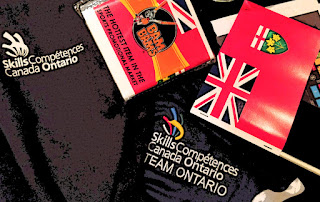 |
| Got the kit… |
Last year we blew provincials and didn’t go through. I lay the blame for that entirely at my own feet. The change to a Toronto based venue meant a cruel and unusual commute that made us exhausted and late; we didn’t have a hope of peak performing (yet we still managed a medal). This year we did back flips arranging hotels and finding ways to minimize the financial burden on our competitors in order to ensure our best shot, and that worked. Leading up to Nationals I made sure everything was taken care of and any possible need was filled prior to sitting down to compete.
Expectations are perhaps the killer here. Our first time around I took Nationals to be a reconnaissance. We’d already over achieved to such a degree at Provincials that I was just happy to be there. Sure, a medal would have been nice, but understanding the contest was my real goal. That we came so close to getting a medal had me convinced we were moving in the right direction. This time around my previous champion gave a detailed rundown of what to expect on Nationals and we didn’t go in blind, yet we have failed to capitalize on that information. This could mean it was bad information, but I doubt that. It could also mean we simply didn’t make the time to make use of that information because my two competitors have an unhealthy competitiveness between them. We have underperformed, yet the competition was described as too easy, and we knew what was coming. How are we bottom half? With the medal ceremony behind us, I’m left wondering where we are, and, as a coach, I don’t like the feeling – the lack of understanding feels like a failure on my part.
This might sound like whinging or poor sportsmanship, but I didn’t spend all the time and money and stress to not place again. This isn’t even a case of gold or die, just knowing we were there or thereabouts would have met my expectations; I don’t think that’s an absurdly challenging goal. If we didn’t want to be competitive, why did we compete?
 |
| Pre-contest huddle. |
One of the more surprising aspects of this trip was just how different my competitor was. On our first go I had what looked like an Eastern European rock star who had the swagger to go with it. He had the technical chops, but his cockiness also meant he’d tackle problems aggressively and with some verve; he wasn’t intimidated by anyone or anything. I suspect that fourth place finish was as much the result of that fearlessness as it was his technical skill.
This time around I had an anxious perfectionist who I couldn’t read very well and (I fear) I didn’t coach as effectively as I could have. Maybe, in this case, a less acerbic approach might have served us better, but my approach to coaching and teaching has always been to encourage an independent and experiential approach to the challenges of technology. I give students the gears if they make a silly mistake, but never penalize them for it. The ones who stick around end up resilient, self-aware and technically superior. I don’t baby students and hand them answers, I’d rather see them struggle to a solution themselves. The result is a technician who might not know all the answers, but damn well knows how to find them.
 |
| Like herding cats… |
Except at Nationals.
This time around I had a university bound, academically strong student for whom this was just one of many feathers in his hat. This is his second national final in an ICT related field in as many weeks. At the CyberTitan National Competition, on our first go at it, we placed as high as I’d hoped we would and that trip was (I think) a great success. My expectations here were actually similar this week, to finish in the top half, but we’ve failed to do that. There were only 7 competitors in the national IT & Networking final – three provinces and all the territories failed to produce candidates who could meet national standards – so finishing in the top half would have meant a medal.
My first national finalist was a college bound kid who had been on the verge of failing in the years before and found his way out of that mess though finding his genius in info-tech. He ended up going to college for IT and considers his Skills experience a vital piece of his career (as he should). I never once heard my first champion say, ‘it’s just IT’ when someone asked him what competition he was in, but I heard that too many times this week. Downplaying the field of study (I fear) when competing at the national level in it was a reflection of the doubt that plagued this medal run. At one point I heard, “I don’t understand why I’m here with all these people” (meaning experts in their skilled trade). I thought it might have been false modesty, but it in retrospect it was doubt, which is a disaster when you’re in a pressure cooker like Skills Nationals. Maybe I should have identified that and talked about it earlier, but if years of straight ‘A’s in computer and software technology courses, multiple provincial medals, full time summer employment as a network technician, a top five finish in the related cybersecurity contest nationally, detailed notes from all the competitors who came before and a coop in IT wasn’t enough to instill some confidence, I fear nothing will. I don’t think this result was a deficit of technical skill.
 |
| Watching mastery across such a wide range of skills never gets old. If you get a chance, go to Skills Nationals. |
This year in electronics we took a giant step backwards, to the point of me wondering if we were ever moving in the right direction. My competitor was crushed by our poor result and this prompted me to chase down her judges and request some clarification on our results. She’d actually ended up in the medals on the two toughest categories (building circuits), which helped restore some confidence. Then we got clarification on what we missed, which has shed such a bright light on what we need to do that I can’t believe we won’t be contenders next year. Her response to all of this was stubborn anger. I can work with that. One of the judges encouraged her to hang in there saying, ‘it’s the failures that toughen you up and eventually make you a champion.’ It’s that kind of thing that makes me want to do the hours and hours of volunteer work it takes to build up to winning provincials again and perhaps going through another exhausting and potentially hope crushing week at nationals.
Maybe one of the things I need to be doing when I’m looking for candidates to take on this overwhelming challenge is to look for the tenacious scrappers who can’t, won’t and don’t stop. Maybe that was missing this year. A student following in his brother’s footsteps for whom things had fallen into place, winning medals even when he claims the whole thing was a disaster was suddenly doubtful of his place in the competition. I don’t know what to do with that. Maybe that judge is right – it’s overcoming the setbacks that make you commit to the competition and fight with conviction. Win or lose, if we left everything on the competition floor I’d be happy with the result, but something stopped us from doing that this time. Perhaps it was the injury, perhaps it was nerves, perhaps I’m just the wrong coach for a this particular student, which is a shame for us both.
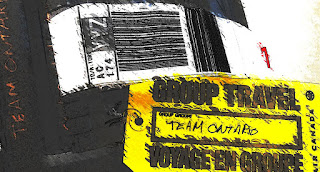 I didn’t do well in school. You can count the number of ‘A’s I got on one hand. Things generally have never come easily to me, I have had to fight for them. I dropped out of college, out of an apprenticeship and struggled to get into and through University. I’m good at many things, but I don’t think I’ve ever been a natural at anything. The things I’m good at are the result of determination and stubborn disregard for failure. It’s that kind of tenacious student that I’m best able to help because I can identify with them. I find the honour roll perfectionists alien and don’t always know how to work with them to bring out their best. Perhaps the best thing I could have done here was to send another teacher instead. If I could go back and rerun this week over and over again Groundhog Day style, that would be one of the variations I’d try.
I didn’t do well in school. You can count the number of ‘A’s I got on one hand. Things generally have never come easily to me, I have had to fight for them. I dropped out of college, out of an apprenticeship and struggled to get into and through University. I’m good at many things, but I don’t think I’ve ever been a natural at anything. The things I’m good at are the result of determination and stubborn disregard for failure. It’s that kind of tenacious student that I’m best able to help because I can identify with them. I find the honour roll perfectionists alien and don’t always know how to work with them to bring out their best. Perhaps the best thing I could have done here was to send another teacher instead. If I could go back and rerun this week over and over again Groundhog Day style, that would be one of the variations I’d try.
I’m most effective helping the stubborn, scrappy student I have much more in common with attain their mastery than I am trying to aim an honour roll kid at gold. Those scrappy students also play to my love of underdogs. As I said earlier, perhaps expectations are what make this so difficult to take. This time I thought I’d brought a howitzer to a knife fight. As fixated as I am in this moment on failing to medal again, in less fraught moments I’m more about a good struggle than I am about winning – but it’d sure be nice, just once, to sit on this long road home with something tangible to show for it.
***
A week after we got back we had an interview with the local paper. When asked what I thought something like Skills Canada does for a student I immediately went to the degree of resilience it develops. I truly believe that competition is good for us all, and that competition has to involve winning and losing. At the opening ceremony the MC asked the audience of hundreds of competitors who was going to win a medal, they all started cheering – the unspoken disappointment was left hanging in the air, you can’t all be winners. More people come home disappointed after Skills Nationals than satisfied. That’s no bad thing. My goal as a coach is to find ways to help competitors put their best foot forward. This year has taught me a lot about how I can better do that.
from Blogger https://ift.tt/2HWYoRz
via IFTTT

